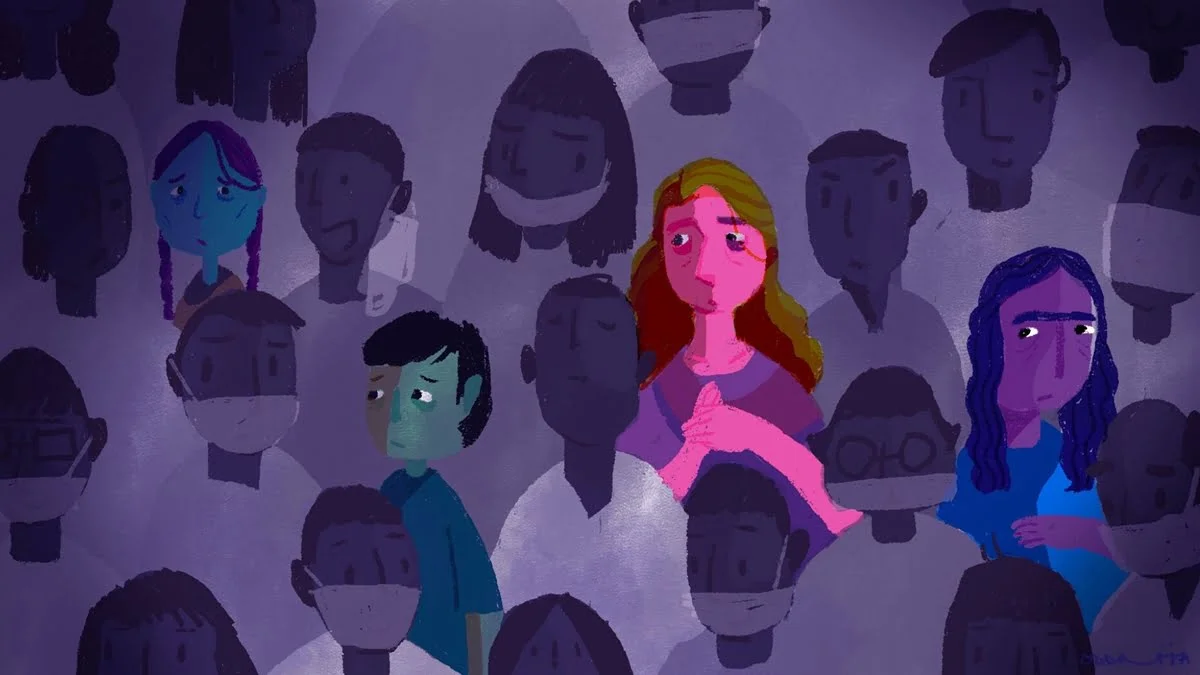Sexual violence in India is one of the most widespread, deep-rooted crimes, the rate of which has been exponentially increasing. According to the National Crime Records Bureau (NCRB), there has been an increase of 902% in the number of rape cases registered in India from 1971 to 2012.
Post the gang rape and murder of a young medical intern in the capital city of the country in 2012, public outrage and protests pushed for massive amendments in criminal law, especially relating to sexual assault and rape. Government data shows that 99 per cent of sexual violence cases are not reported. The reasons being shame, stigma, and lack of access to legal redressal mechanisms.
Even those survivors who make it to the doors of legal redressal are subjected to immense stigma and trauma at the hands of law enforcement officials, police, lawyers and judges. The very courtrooms that are meant to be temples of justice have become epicenters of victim-blaming and shaming.

“A woman cannot be herself in the society of the present day, which is an exclusively masculine society, with laws framed by men and with a judicial system that judges feminine conduct from a masculine point of view,” noted famous modern playwright Henrik Ibsen.
In 2017, a young law student filed a complaint alleging gang rape against three of her classmates. The woman had a consensual relationship with one of the boys which ended in a month. After this, the boy used her nude images to blackmail her and rape her for the next 18 months. He also forced her to have sex with two of his friends. On one occasion, they gang-raped her.
In another 2020 bail order of a man accused of sexual assault (Vikram v State of Madhya Pradesh MCRC 23350/ 2020, dated 30.7.2020), the Madhya Pradesh High Court imposed some bizarre and problematic bail conditions. The accused was asked to go to the survivor’s house and the survivor was asked to tie a rakhi to his hand, exchange sweets, gifts, and blessings
While hearing a bail petition in this case (Vikas Garg v. State of Haryana; Cr. M. No. 23962/2017, order dated 13.09.2017) the Punjab and Haryana High Courts granted bail to the accused citing that the ‘promiscuous‘ character of the complainant raised doubts regarding the genuineness of the complaint. The 12-page bail order reeks of victim shaming and blaming. The young survivor was rebuked for smoking, drinking and having casual sex.
The 2017 Delhi High Court judgment ( Mahmood Faruqui v Govt of NCT of Delhi; 2017VIIIAD(Delhi)321) acquitting Mahmood Faruqui of charges of rape is highly problematic and erroneous, to say the least. It created a different test for consent. The court said that educated women must make their unwillingness known more clearly.
Further, the judgment mentions that if physical contact existed between the survivor and the accused in the past, it is difficult to decipher if little resistance or a feeble no, may mean yes. The judgment set an extremely dangerous precedent in rape law jurisprudence and the interpretation of consent.

In 2020, while hearing the petition for anticipatory bail for a rape accused, the Karnataka High Court single judge bench led by Justice Krishna Dixit expressed reservations regarding the version of the case as told by the survivor. While granting bail (Rakesh B v. State of Karnataka; Crl. P. No. 2427/2020, order dated 22.06.2020) to the accused, he said ‘it is unbecoming of an Indian woman to fall asleep after being ravished’.
He further questioned why she let the accused in the car, agreed to drink alcohol with him, and why she did not raise an alarm earlier. Later, his remarks about the survivor were expunged from the order but it still reflects the state of Indian courtrooms.
In another 2020 bail order of a man accused of sexual assault (Vikram v State of Madhya Pradesh MCRC 23350/ 2020, dated 30.7.2020), the Madhya Pradesh High Court imposed some bizarre and problematic bail conditions. The accused was asked to go to the survivor’s house and the survivor was asked to tie a rakhi to his hand, exchange sweets, gifts, and blessings.
Advocate Aparna Bhat and other activists filed a petition in the Supreme Court challenging the dangerous legal precedent set in this bail order. The appellants brought to light several cases where irrelevant and problematic bail conditions were imposed or a compromise of marriage between the accused and survivor was suggested as a legal remedy.
Also read: Karnataka HC Judge’s Remarks On Rape Survivor Reflects The Sexism In Indian Courtrooms
They stated that such compromise as a form of legal remedy is abhorrent and drastically scarring to the dignity of a survivor. It is also hugely traumatic for the survivor to undergo such an encounter with their predator. The bail conditions were then expunged by the court. But more importantly, the judgment gave an elaborate commentary on the crisis of gender-based violence, especially as it prevails in India, elaborating the factors that affect it, and state of redressal mechanisms and laid down guidelines to remedy the same.

Gender-based violence is systemic and institutional. It happens in both public and private spaces including homes, schools, streets and workplaces. The prevalence of patriarchal social norms enables a culture that breeds such violence. Sexual violence is a manifestation of the unequal power dynamics between men and women. Other socio-economic factors like caste, class, religion, and sexuality further aggravate such crimes.
Sexual violence is most often shrouded in a culture of silence. Survivors are told not to speak out, let alone report. Stigma, shame, social ostracisation, economic dependence are all factors that disincentivise women from reporting sexual violence. Hence, the incidence of sexual violence is much higher than the reported numbers.
Another element that fosters sexual violence is survivor-blaming. Survivors are blamed for the crime that has been subjected on them, which is hugely traumatic. Patriarchal social norms, myths, and stereotypes about gender fuel survivor-blaming where the woman’s clothes, character, sexuality, past sexual encounters and almost every act is scrutinised.
The stereotype of an ideal sexual assault survivor disqualifies several accounts of lived experiences of survivors. Myths and stereotypes about rape undermine the credibility of women who are seen to ‘deviate‘ from the notions of chastity and resistance in courtrooms. Therefore, it is imperative that we dismantle these notions and prevent the process of seeking justice from becoming another experience of oppression for survivors of sexual violence
Sexual violence is also varied in degree. Several incidents fall within the rubric of sexual violence like eve-teasing, stalking, verbal and physical assault, and harassment which are often trivialised or normalised, even romanticised in pop culture. Social attitudes grant impunity to men and condone their actions which leads to greater crimes of violence against women.
The judgment in Advocate Aparna Bhat’s appeal clarifies that bail conditions must be in the interest of justice. The court further said that the concept of compromise, especially in the form of marriage between an accused and a survivor in cases of sexual violence is abhorrent and a clear violation of a woman’s right to dignity.

The role of the courts is to ensure fairness and impartiality to survivors at every stage of a criminal proceeding. Reinforcing moral bias in courtrooms would adversely impact fairness and justice. The court held that reasoning/ language that diminishes the offense or trivialises the trauma of the survivor is to be avoided in all circumstances. Past conduct of the survivor, her actions, clothing and the like are deemed to be irrelevant.
Similarly, bail conditions that implicitly condone the crime or cause secondary trauma to the survivor through its mediating processes like rendering an apology which will enable contact between the accused and the survivor are forbidden. The law does not permit any act that causes trauma to a survivor of sexual violence and the court laid down guidelines regarding the same.
The court further mentions a mandatory module on gender sensitisation as part of the training of judges. This module must aim at streamlining ways in which judges can be more sensitive in hearing and deciding cases of sexual assault, and eliminating entrenched social bias.
The stereotype of an ideal sexual assault survivor disqualifies several accounts of lived experiences of survivors. Myths and stereotypes about rape undermine the credibility of women who are seen to ‘deviate‘ from the notions of chastity and resistance in courtrooms. Therefore, it is imperative that we dismantle these notions and prevent the process of seeking justice from becoming another experience of oppression for survivors of sexual violence.
Also read: A Dalit Woman’s Body In The Indian Courtrooms
Prakshi is a law student and activist. She is the co-founder of a non-profit called Her Adhikaar. She has experience working at non-profits for over 4 years. She is a certified menstrual and sexuality educator for adolescents. Her areas of interest lie at the intersection of law, policy and gender. You may find her on LinkedIn, Instagram, Twitter and Facebook
Featured Image Source: The Swaddle




